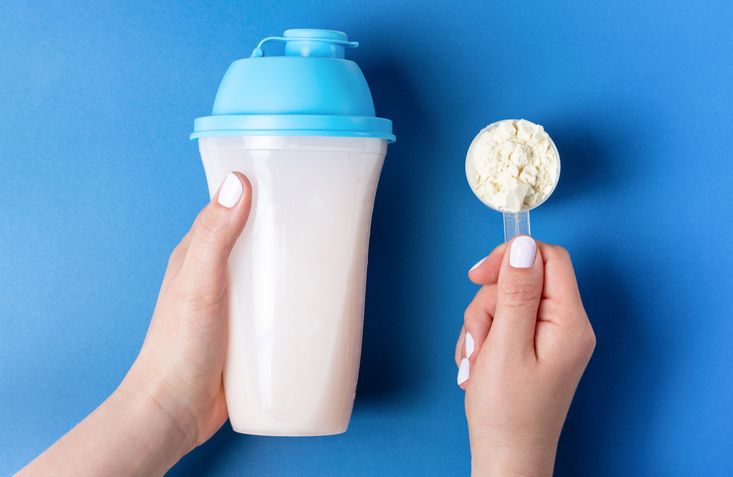
- Home
- Trend
- Weight Loss Strategies
- Acne Tips
- Hair Health Information
- Blemish Removal Tips
- Acne Scar Removal Tips
- Muscle Building Techniques
- Intimate Care Tips
- Postpartum Intimate Care
- Eye Bags Wiki
- Tips for Face Slimming
- Secret of Permanent Hair Removal
- Breast Enlargement Tips
- Cure to Snoring
- Marionette Lines
- Skin-Tightening Secrets
Protein powder has become an increasingly popular weight loss method in recent years. Originally used for muscle building, it has now been proven effective for fat loss as well. Once favored mostly by fitness enthusiasts as a dietary supplement to boost protein intake, protein powder is now recognized for its ability to help reduce body fat. In this article, we’ll explore six common types of protein powder, along with how to take it correctly for maximum slimming benefits.
What is Protein Powder?

Protein powder is a by-product of the dairy industry. It’s made by extracting usable fiber and nutrients from high-protein foods, then grinding them into powder through a separation process. The most common method is to isolate whey protein from dairy products like milk and cheese, discarding the casein and using only the whey. Whey used to be treated as waste, but nutritionists discovered it contains high levels of carbohydrates, fat, lactose, and protein. Specialized filtration and drying techniques were developed to turn whey into a protein supplement.
Protein can also come from plant-based sources, such as pea protein and soy protein, making it suitable for vegetarians as well.
Why Can Protein Powder Help Burn Fat?

Protein powder helps build muscle and reduce fat, which in turn lowers body fat percentage. You’ve probably seen many fitness buffs drinking protein shakes—but is protein powder just for people who work out? Can you still take it if you're not exercising?
Actually, protein powder is a nutritional supplement and isn’t only for people who train. It doesn’t matter whether you exercise or not, and you don’t need to worry about rebound weight gain from insufficient muscle activity. Protein powder supports weight loss by increasing satiety, which helps reduce carbohydrate and starch intake when used as a meal replacement. At the same time, it supplies protein—essential for muscle firmness and skin elasticity—while promoting fat burning.
免費體驗
S6 Body Sculpting Treatment
1 Minute Self-Registration
Date should not be before minimal date
If You Already Eat Protein-Rich Foods, Do You Still Need Protein Powder?
Some people wonder: if you’re already eating protein-rich foods, do you still need protein powder? If you can get enough protein from a healthy diet, why bother with supplements?
While protein content may be similar between whole foods and protein powder, the key benefit of protein powder is better absorption—especially for people with fast metabolism or poor digestion. It helps speed up digestion and boosts muscle growth. Most users find it doesn’t cause weight gain and even helps firm up the body.
However, remember that protein powder is processed and often fortified with micronutrients, whereas natural protein-rich foods contain a more balanced profile of vitamins and minerals. Unless you're significantly lacking protein or trying to gain muscle and lose fat, eating whole foods may be sufficient to meet your nutritional needs.
The 6 Most Common Types of Protein Powder
1. Whey Protein
The most common type on the market, whey protein is extracted from milk and contains fat, carbs, lactose, and protein. It offers a well-rounded mix of nutrients that support protein absorption—carbs and sugars help the body absorb protein more effectively and replenish glycogen lost during workouts. It’s also budget-friendly and popular among gym-goers.
2. Whey Protein Isolate
This form is highly refined, containing 90–95% protein with minimal carbs, fat, and lactose—ideal for those on low-carb diets or with lactose intolerance.
3. Whey Protein Hydrolysate
This is the most advanced version, with the highest protein purity. The proteins are broken down into smaller molecules, making it extremely easy to digest—perfect for people with digestive issues or lactose intolerance. However, it tends to be more expensive and may taste bland or even slightly bitter, so taste-sensitive users should consider this carefully.
4. Weight Gainer
Best for those with low body fat, fast metabolism, or insufficient calorie intake. Each serving contains around 800–900 kcal, offering a near 2:1 or 1:1 ratio of carbs to protein to boost daily energy levels. Not recommended for everyone, as it can lead to rapid weight gain if misused—especially risky during weight loss. Using it as a meal replacement without proper understanding can also burden your digestive system.
5. Casein
Like whey, casein comes from milk and accounts for up to 80% of the protein in natural milk. While it doesn’t help build muscle, it prevents muscle breakdown and maintains protein levels during sleep. Casein forms a gel in the stomach and takes 5–7 hours to digest, so it’s not suitable for those with slow digestion or gastrointestinal issues.
6. Vegan Protein
A lifesaver for vegetarian fitness fans, plant-based protein powder is gaining popularity. Since vegetarians can’t rely on meat and eggs for protein, plant proteins from soy, peas, and brown rice are blended with amino acids to promote muscle growth and definition using all-natural ingredients.
What Else Can Protein Powder Do Besides Aid Weight Loss? 5 Key Benefits
1. Speeds Up Digestion
After a workout, your body needs more leucine to help absorb protein and other nutrients. However, 100 grams of regular protein-rich food only contains about 1 gram of leucine. Protein powder, on the other hand, contains up to 10 times more leucine than a regular egg. Just 1 to 2 tablespoons is enough to replenish your leucine needs—no need to overeat or worry about excess calories leading to weight gain.
Moreover, getting protein from meat also means ingesting animal fat. Unused fat may accumulate as toxins or waste in the body, and meat takes 2–3 hours to digest. In contrast, protein powder is absorbed within 20–30 minutes, delivering the nutrients needed to build lean muscle quickly.
2. Works as a Meal Replacement
Protein powder helps reduce overall appetite and curbs intense food cravings. It increases satiety—drinking it before meals can significantly cut your regular food intake, which also lowers your calorie consumption. Many products on the market now use protein powder as a meal replacement, allowing you to maintain balanced nutrition while effectively losing weight.
3. Boosts Fat Metabolism
Protein powder promotes metabolism and speeds up fat burning. It helps eliminate accumulated toxins and waste, improving digestion and bowel movement. You might notice weight loss after starting protein powder—that’s because it burns stubborn fat stored in areas like arms, thighs, hips, or waist. As your muscle mass increases and fat mass decreases, your body becomes more toned and shapely.
4. Supports Muscle Development
Protein powder also helps prevent muscle loss, maintaining elasticity and improving pain tolerance. Drinking it after workouts helps relieve soreness from strength training and reduces post-exercise discomfort. It also boosts muscle endurance and helps restore glycogen levels. Higher glycogen levels mean better stamina and improved physical performance.
5. Enhances Healing Ability
Some fitness enthusiasts have noticed that wounds heal faster after taking protein powder, especially burns or chronic injuries. Areas that used to take a long time to recover may heal more quickly, with less pain after regular protein powder intake.
免費體驗
S6 Body Sculpting Treatment
1 Minute Self-Registration
Date should not be before minimal date
Is Protein Powder Suitable for Everyone? 5 Potential Side Effects
1. Indigestion
Protein powder can cause digestive issues for people with weak stomachs. Excess intake may overload the kidneys or gut, as the body can struggle to handle large amounts of protein. Some people have fewer enzymes for digesting protein, leading to bloating. If you have chronic digestive problems, avoid using protein powder as a meal replacement to protect your digestion.
2. Difficult to Sculpt Ideal Muscle Definition
Protein powder reduces fat and increases muscle, but this isn’t always ideal for women. While men may embrace broader shoulders and a bulkier build, many women prefer a curvier silhouette. Overconsuming protein powder might lead to overly firm muscles instead of a slim figure, trading fat for bulk rather than achieving a desired shape. Women should monitor their intake carefully to avoid building unwanted muscle mass.
3. May Cause Acne or Breakouts
One downside is its potential effect on skin. Studies show growth factors in protein powder may increase oil production, disrupting hormonal balance and insulin response. This can lead to oily skin and breakouts, diminishing your skin’s clarity and smoothness.
4. Lowers Urine pH
High-protein diets may lower the pH of urine and increase uric acid levels, which can impair kidney function. Poor kidney health can lead to serious issues like kidney stones, diabetes, acidosis, or chronic nephritis.
5. Allergic Reactions
Before using protein powder for weight loss, it’s essential to check its ingredients. People with lactose intolerance should be especially cautious, as many protein powders are derived from milk. If you're allergic to dairy, this method may not be suitable for you.
How to Take Protein Powder Safely: Different Goals, Different Approaches
1. For Fitness Enthusiasts
If you work out regularly, consume 20–30 grams of protein powder either 1–2 hours before exercise or within 20–30 minutes after your session. This replenishes protein and carbs, helping boost endurance and enhance muscle development.
2. For Weight Loss
If you’re using protein powder solely for weight loss and don’t exercise, drink it before meals. This can help suppress appetite, prevent overeating, and reduce calorie intake while still ensuring your body gets the nutrients it needs.
Perfect Medical S6 Body Sculpting Treatment – Slim Down Easily Without Tracking Protein Powder Intake
Protein powder has its pros and cons, and balancing intake can be tricky. Looking for a lower-risk slimming option? We highly recommend the Perfect Medical S6 Body Sculpting Treatment, a non-invasive way to lose fat and tone your body—no surgery, no medication, no injections!
The S6 treatment uses advanced laser technology to break down fat deposits into fatty acids, which are then naturally flushed out through your metabolism. Combined with vacuum suction technology, the treatment targets stubborn fat areas like the belly, waist, thighs, calves, arms, hips, and back—completely contouring your body with 360° precision.
The best part? There’s no need for post-treatment care or healing, and treated areas won’t regain fat, eliminating the risk of rebound weight gain! Interested? Register now to enjoy: a professional body analysis + a session of Perfect Medical S6 Body Sculpting Treatment. Like our Facebook page and get a bonus gift! Spots are limited—act fast or miss out!
Book Now: Perfect Medical S6 Body Sculpting Treatment免費體驗
S6 Body Sculpting Treatment
1 Minute Self-Registration
Date should not be before minimal date
FAQ

Can Protein Powder Help With Weight Loss?
Yes, when used correctly as a supplement or meal replacement.
Recommended Protein Powder Brands?
Welina and Mono-Corporation’s soy protein are suitable for vegetarians.
How Much Protein Powder Should I Take Daily?
10 to 30 grams is sufficient.
Can I Drink Protein Powder Every Day?
Yes, ideally 1 to 3 times daily, with about 10 grams per serving.
When Is The Best Time To Take Protein Powder?
Within 30 minutes after exercise.








